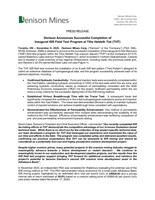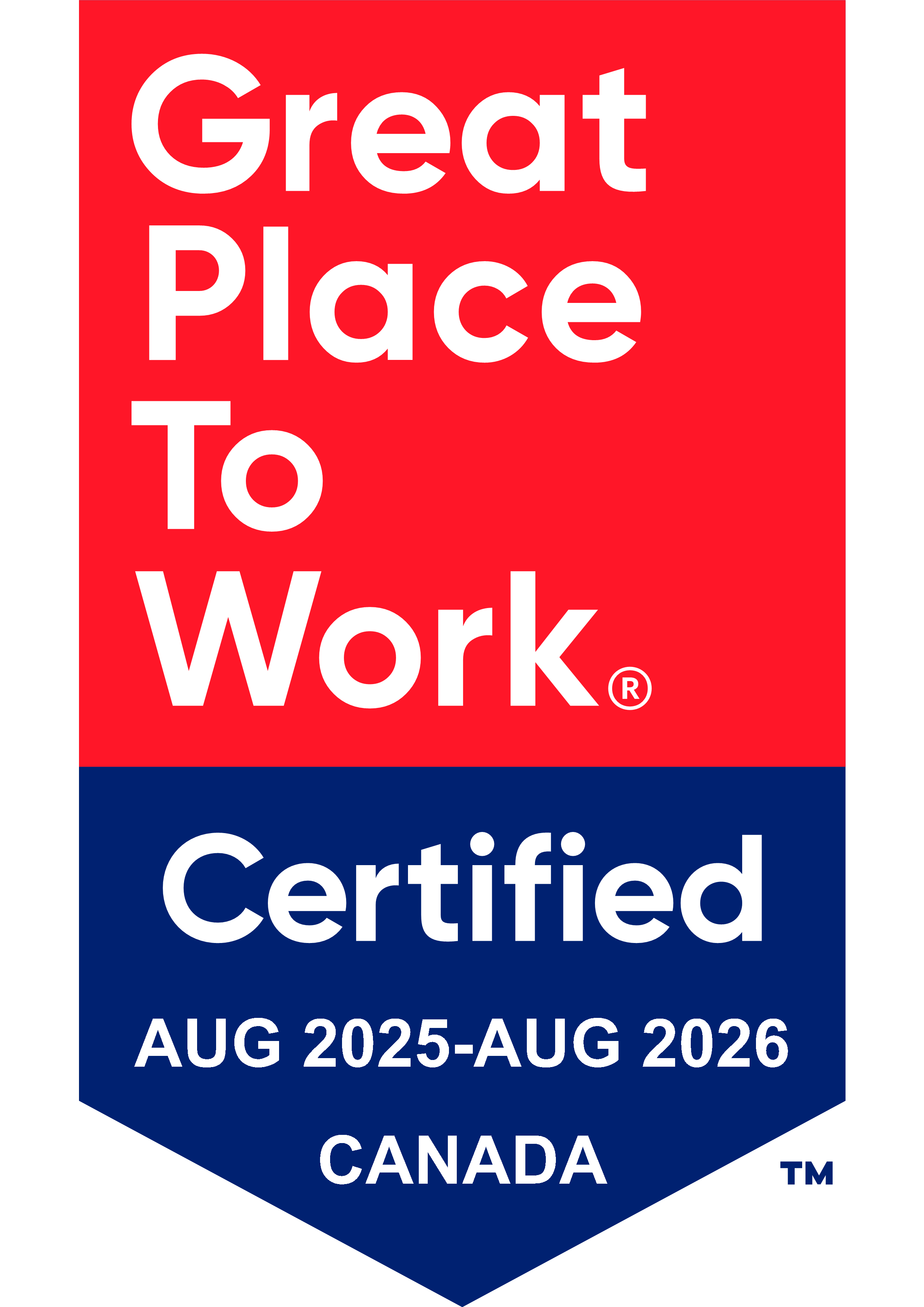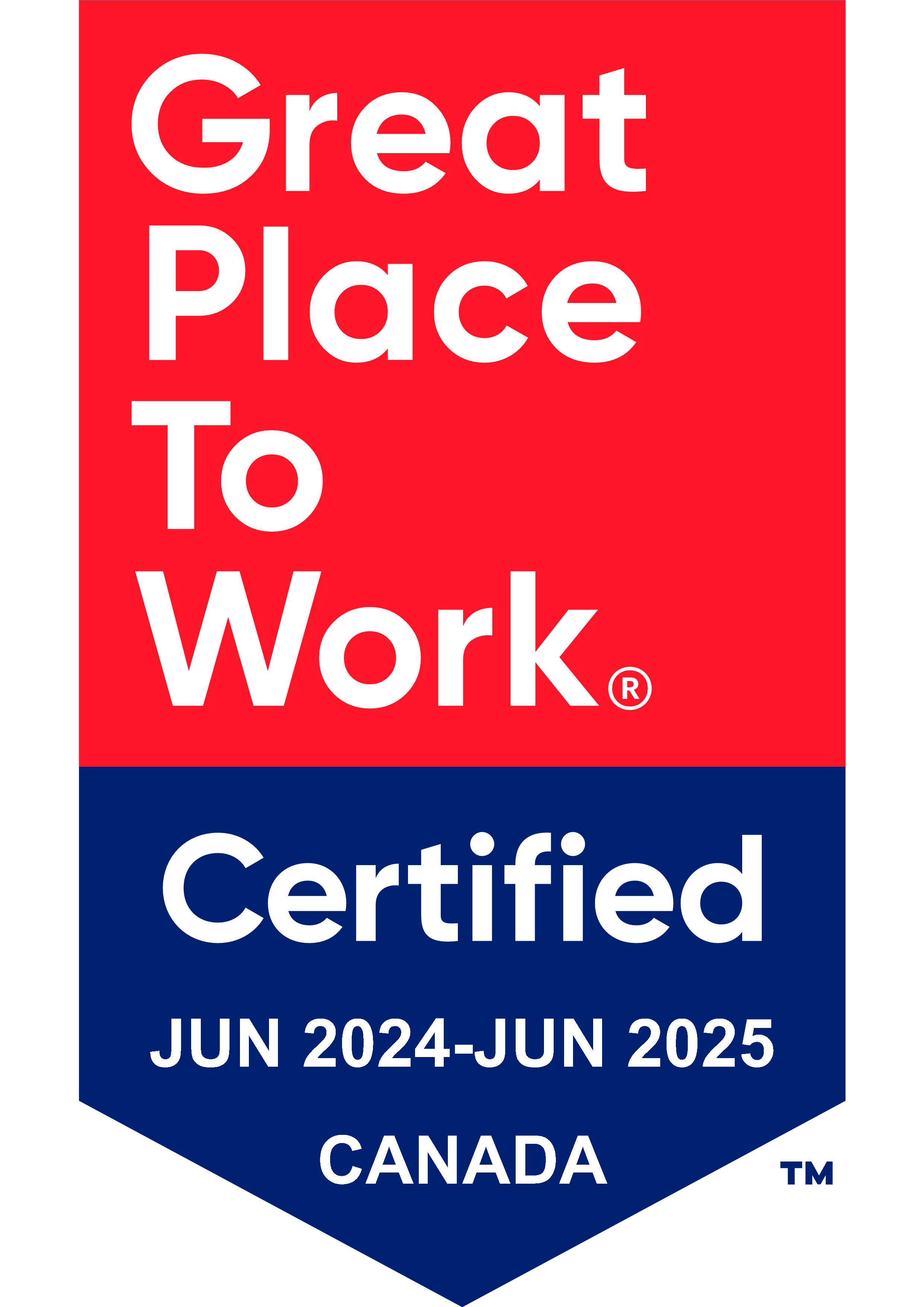News
Denison Announces Successful Completion of Inaugural ISR Field Test Program at Tthe Heldeth Túé (THT)
TORONTO, Nov. 6, 2023 /CNW/ - Denison Mines Corp. ("Denison" or the "Company") (TSX: DML) (NYSE American: DNN) is pleased to announce the successful completion of the inaugural In-Situ Recovery ("ISR") field test program within the Tthe Heldeth Túé uranium deposit ("THT") at the Company's 67.41% owned Waterbury Lake Uranium Project ("Waterbury"), which is located in northern Saskatchewan, Canada and is situated in close proximity to key regional infrastructure, including roads, the provincial power grid, and Denison's 22.5%-owned McClean Lake mill (see Figure 1). View PDF version
The THT ISR field test involved the installation of an 8-well ISR test pattern ("Test Pattern") designed to collect an extensive database of hydrogeological data, and the program successfully achieved each of its planned objectives, including:
- Confirmed Hydraulic Conductivity: Pump and injection tests were successfully completed within the Test Pattern, validating hydraulic connectivity in 100% of the test wells within the ore zone, and achieving hydraulic conductivity values (a measure of permeability) consistent with the 2020 Preliminary Economic Assessment ("PEA") for the project. Sufficient permeability within the ore zone is a key criteria for the successful deployment of the ISR mining method.
- Established 10-hour Breakthrough Time with Ion Tracer Test: A subsequent tracer test significantly increased the confidence in the initial hydrogeological evaluations (pump and injection tests) within the Test Pattern. The tracer test demonstrated Denison's ability to maintain hydraulic control of injected solutions and achieve breakthrough times consistent with expectations.
- Demonstrated the Effectiveness of Permeability Enhancement: One method of permeability enhancement was successfully deployed from multiple wells demonstrating the suitability of the method to the THT deposit. Efficiency of permeability enhancement was verified by comparison of pre- and post-permeability enhancement hydraulic testing.
David Cates, Denison's President and Chief Executive Officer, commented "Our recently completed ISR de-risking efforts at THT demonstrate the competitive advantage of our in-house Saskatoon-based technical team. While there is no short-cut for the collection of key project-specific technical data, our team developed a program for THT that leveraged our experience and maximized the value of our time and efforts in the field. The program was completed safely and delivered excellent results, confirming our previous expectations that THT can be amenable to ISR mining and should be considered as a potentially low-cost and highly prospective uranium development project.
Despite higher uranium prices, many potential projects in the uranium mining industry struggle to meaningfully advance towards a future development or restart decision. We continue to meaningfully invest in our exploration and development pipeline projects, and the results from the ISR field test program support bringing THT forward for additional evaluation, and reinforce the project's potential to become Denison's second ISR uranium mine development asset in the Athabasca Basin".
In November 2020, an independent PEA was completed for Waterbury evaluating the potential use of the ISR mining method at THT. The PEA demonstrated robust economics for a small-scale Athabasca Basin ISR mining project, highlighted by an estimated all-in cost per pound U3O8 of US$24.93 and a pre-tax internal rate of return estimated at 50.0% based on a uranium selling price of US$65.00 per pound U3O8 (see press release dated November 17, 2020).
The PEA included recommendations to further advance the technical de-risking of the project with the collection of site-specific data. As the PEA is preliminary in nature, there is no certainty that the results of the PEA will be realized and mineral resources that are not mineral reserves do not have demonstrated economic viability.
The 2023 ISR field test program was designed to validate the permeability of THT, and to collect a database of hydrogeological and metallurgical data to further evaluate the ISR mining conditions present at the deposit. This data is expected to de-risk the ISR requirements related to permeability and is to be further incorporated into ISR mine planning efforts as part of the completion of a potential future Pre-Feasibility Study ("PFS") for THT.
The Test Pattern consists of 8 small diameter wells in the Eastern Pod of THT (see Figure 2) – made up of four monitoring wells, two pump/injection wells, one Vibrating Wire Piezometer ("VWP") and one recharge well. Each test well was drilled to their target depths and, as applicable, outfitted with well screens and/or pressure monitoring devices.
Core collected from the test wells within the mineralized zone is also expected to allow Denison to verify and update the current mineral resource estimate for the deposit and support future wellfield design and mineral processing assessments.
The 2023 ISR field test program included preliminary hydrogeological tests completed by using the test wells to move water through the Test Pattern. Measurements of the movement of water (hydraulic pressure changes) within the ore zone provide evidence of the hydraulic conditions present and are indicative of the potential movement of mining solution in an ISR mining operation. Over 20 different pump, injection, or slug tests were completed during the program.
Results from the hydrogeological testing produced hydraulic conductivity values consistent with the PEA. Importantly, 100% of the wells located within the Test Pattern showed hydraulic connectivity with another test well.
Additional supportive test work completed during the program included permeability and porosity tests conducted either downhole or on mineralized drill core recovered during the test program.
Following hydrogeologic testing, a 2-hole ion tracer test was completed within the Test Pattern. The ion tracer was injected into GWA-003A (Injection well), with pumping occurring from the extraction well (GWA-002). Water recovered from the extraction well was then recirculated until concentrations of the ion tracer stabilized.
After completion of the ion tracer test, remediation was then conducted to demonstrate the ability to remove injected tracer fluid from the Test Pattern. Injection was halted at the injection well and the extraction well continued to pump to remove the remaining injected ion tracer. Based upon tracer concentrations measured during the two-day clean-up period, 89% of the injected tracer mass was recovered in the extraction well.
Vertical hydraulic control during the tracer test was confirmed through monitoring of the VWP installed in GWA-004, which provided pressure recordings at 3 positions in the sandstone above the mineralized zone, 3 positions in the mineralized zone, and 2 positions in the basement horizons. Hydraulic control was also validated through sampling of the four perimeter monitoring wells for total dissolved solids ("TDS") values before and after the ion tracer test. No elevated values in TDS were observed outside of the test area during the ion tracer test, confirming no migration of the tracer outside of the two-spot pattern.
One method of permeability enhancement was successfully evaluated on three test wells, with efficiency verified by comparison of pre- and post-permeability enhancement hydraulic conductivity tests. Permeability enhancement has been proven to increase and normalize hydraulic conductivity in the area proximal to the wellbore. This is important as it provides a useful tool for increasing contact of injected fluids with the ore zone to maximize uranium recoveries in an ISR mining environment.
In addition to the hydrogeological tests described above, samples will be collected from the drill core recovered from the test wells to facilitate (1) assessment of matrix permeability to inform an initial model of the hydrogeological variations of the deposit, (2) future column leach and core leach testing to investigate the uranium extraction curve, lixiviant requirements, reagent consumption and solution flow rates; and (3) characterization of hydrogeologic units and anticipated flow path distribution.
Waterbury Lake is owned by the Waterbury Lake Uranium Limited Partnership, of which Denison Waterbury Corp. (a wholly-owned subsidiary of Denison) owns 67.41% and Korea Waterbury Lake Uranium Limited Partnership ("KWULP") owns 32.59%. KWULP is comprised of a consortium of investors, in which Korea Hydro & Nuclear Power holds a majority position. More information about the project is available in the technical report titled "'Preliminary Economic Assessment for the Tthe Heldeth Túé (J Zone) Deposit, Waterbury Lake Property, Northern Saskatchewan, Canada' with an effective date of October 30, 2020" a copy of which is available on Denison's website and under its profile on SEDAR+ at www.sedarplus.ca and on EDGAR at www.sec.gov/edgar.shtml.
Denison is a uranium exploration and development company with interests focused in the Athabasca Basin region of northern Saskatchewan, Canada. The Company has an effective 95% interest in its flagship Wheeler River Uranium Project, which is the largest undeveloped uranium project in the infrastructure rich eastern portion of the Athabasca Basin region of northern Saskatchewan. In mid-2023, a Feasibility Study was completed for Wheeler River's Phoenix deposit as an ISR mining operation, and an update to the previously prepared PFS was completed for Wheeler River's Gryphon deposit as a conventional underground mining operation. Based on the respective studies, both deposits have the potential to be competitive with the lowest cost uranium mining operations in the world. Permitting efforts for the planned Phoenix ISR operation commenced in 2019 and have advanced significantly, with licensing in progress and a draft Environmental Impact Statement submitted for regulatory and public review in October 2022.
Denison's interests in Saskatchewan also include a 22.5% ownership interest in the McClean Lake Joint Venture, which owns several uranium deposits and the McClean Lake uranium mill, contracted to process the ore from the Cigar Lake mine under a toll milling agreement, plus a 25.17% interest in the Midwest Main and Midwest A deposits and a 67.41% interest in the THT and Huskie deposits on the Waterbury Lake property. The Midwest Main, Midwest A, THT and Huskie deposits are located within 20 kilometres of the McClean Lake mill.
Through its 50% ownership of JCU (Canada) Exploration Company, Ltd ('JCU'), Denison holds additional interests in various uranium project joint ventures in Canada, including the Millennium project (JCU, 30.099%), the Kiggavik project (JCU, 33.8118%) and Christie Lake (JCU, 34.4508%).
Denison's exploration portfolio includes further interests in properties covering approximately 285,000 hectares in the Athabasca Basin region.
Follow Denison on Twitter @DenisonMinesCo
The technical information contained in this release has been reviewed and approved by Mr. Chad Sorba, P.Geo., Denison's Director, Technical Services, who is a Qualified Person in accordance with the requirements of NI 43-101.
Certain information contained in this news release constitutes 'forward-looking information', within the meaning of the applicable United States and Canadian legislation, concerning the business, operations and financial performance and condition of Denison. Generally, these forward-looking statements can be identified by the use of forward-looking terminology such as 'potential', 'plans', 'expects', 'budget', 'scheduled', 'estimates', 'forecasts', 'intends', 'anticipates', or 'believes', or the negatives and/or variations of such words and phrases, or state that certain actions, events or results 'may', 'could', 'would', 'might' or 'will' 'be taken', 'occur' or 'be achieved'.
In particular, this news release contains forward-looking information pertaining to the following: scope, objectives and interpreted results of the ISR test program at THT; future plans and objectives for Waterbury, including further studies, analysis and a potential future resource estimate update and PFS; and expectations regarding its joint venture ownership interests and the continuity of its agreements with its partners and third parties.
Forward looking statements are based on the opinions and estimates of management as of the date such statements are made, and they are subject to known and unknown risks, uncertainties and other factors that may cause the actual results, level of activity, performance or achievements of Denison to be materially different from those expressed or implied by such forward-looking statements. For example, the modelling and assumptions upon which the plans for Waterbury Lake are based may not be maintained after further work is completed. In addition, Denison may decide or otherwise be required to discontinue testing, evaluation and other work if it is unable to maintain or otherwise secure the necessary resources (such as testing facilities, capital funding, regulatory approvals, etc.). Denison believes that the expectations reflected in this forward-looking information are reasonable but no assurance can be given that these expectations will prove to be accurate and results may differ materially from those anticipated in this forward-looking information. For a discussion in respect of risks and other factors that could influence forward-looking events, please refer to the factors discussed in Denison's Annual Information Form dated March 27, 2023 or subsequent quarterly financial reports under the heading 'Risk Factors'. These factors are not, and should not be construed as being exhaustive.
Accordingly, readers should not place undue reliance on forward-looking statements. The forward-looking information contained in this news release is expressly qualified by this cautionary statement. Any forward-looking information and the assumptions made with respect thereto speaks only as of the date of this news release. Denison does not undertake any obligation to publicly update or revise any forward-looking information after the date of this news release to conform such information to actual results or to changes in Denison's expectations except as otherwise required by applicable legislation.
SOURCE Denison Mines Corp.






